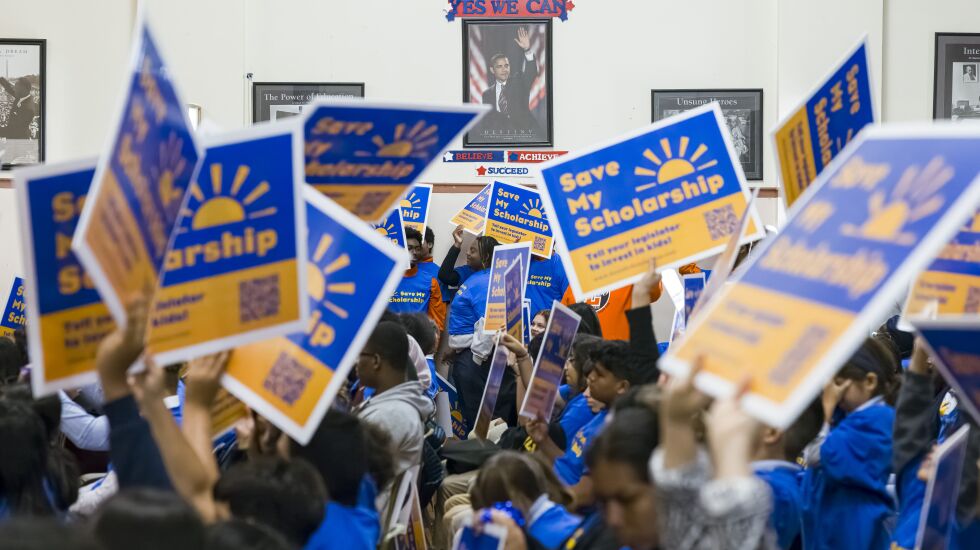
Illinois’s five-year-old experiment with a taxpayer-supported school choice program is ending. Despite a concerted push from Republican lawmakers and advocacy groups during this week’s fall legislative session, lawmakers did not take action and the Invest in Kids tax credit scholarship program is set to sunset at the end of this school year.
The controversial program allows taxpayers to earn an income tax credit by donating to scholarship funds across the state that send students from lower-income households to private schools. About 9,700 students across the state received scholarships last year. Students with scholarships this year will be allowed to finish out the school year.
Proponents say the program offers school choice for low-income students. Empower Illinois, the state’s largest scholarship granting organization, says the average family income for its scholarship recipients was $45,000. About two-thirds of the children on scholarship in Cook and surrounding collar counties in 2022 were from families of color, according to the group’s annual report.
They vow to continue the fight to save the program when lawmakers return in January.
But critics argue the $75 million program takes money from already underfunded public schools and funnels public dollars to private schools, many of which are religious. Earlier this week U.S. Rep. Jan Schakowsky, along with other Democratic lawmakers, issued a joint statement calling for an end to the program, saying the majority of participating schools have policies that “openly discriminate against students on the basis of disability status, gender identity, [and] sexual orientation.”
To try to save the program, a handful of Chicago-area Democratic state representatives, with the backing of Republican colleagues, introduced a proposal extending the act by five years. It also reduces the tax credit amount and individual giving cap from $1 million to $500,000, sharpened the focus on lower-income students and shrinks it to a $50 million program.
But without majority support from the House Democrats, Speaker Emanuel “Chris” Welch, D-Hillside, never called the bill to the House floor.
A last minute push
Hundreds of people, wearing blue shirts and carrying signs reading “Save My Scholarship” were in Springfield during all six days of the fall session that ended Thursday, rallying behind the law.
One was Patti Serpa, a single parent from Chicago’s Pilsen neighborhood whose son goes to St. Pius V school on full scholarship. Serpa says St. Pius offers a theater program, chess club and other opportunities that aren’t available at the Chicago public school her son used to attend.
“His reading levels were lower, the care from the teachers was not as strong as it is in the Catholic school,” Serpa said.
Students from families making no more than 300% of the federal poverty level can apply: To qualify, a family of four can’t make more than $90,000 a year. About two-thirds of scholarship recipients last school year came from families earning $55,500 or less, state data shows. Serpa says she and many other single-parent families who work multiple jobs rely on scholarship money.
“I am in and out of work,” Serpa said. “I was a caretaker for 30 years for a disabled daughter. And now, if I don’t have this scholarship, [my son] has to go back to public school. And I don’t want him back at public school.”
Students who benefit from the program and their families stood side-by-side with Republican lawmakers at press conferences throughout the week, trying to garner support for extending it. At one event, Senate minority leader John Curran, R-Downers Grove, said the House proposal, which never got called for a vote, was a compromise and their only shot at saving the program.
“We are either leaving here with our heads held high because we have acted and saved opportunities for these low-income students,” Curran said earlier this week. “Or are we returning to our districts in a cloud of failure because we will be failing thousands of low-income families throughout this state, and ending their educational opportunity in their current schools.”
What happens next?
According to Empower Illinois, donations will cease after Dec. 31, and students will lose their scholarships through this program for the 2024-25 school year, “interrupting their education and creating instability for their families.”
Serpa says she wished lawmakers could have saved the program before the holiday season.
“It would have been much nicer not having to worry about ‘Okay, what’s gonna happen next year?” she said.
And now that lawmakers have gone back to their home districts for the year, House Minority Leader Tony McCombie, R-Savanna, says she hopes lawmakers and advocates on both sides of the issue will use the remainder of the year to reach a compromise they can act on when they return to Springfield in the new year.
Mawa Iqbal covers Illinois state government and politics for WBEZ. Follow @mawa_iqbal.







